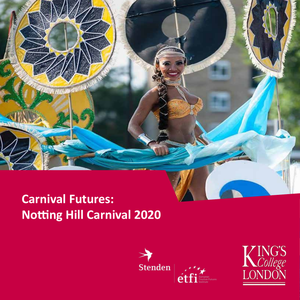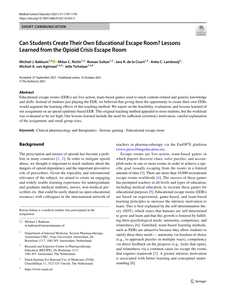De dissertatie "Probing Futures, Acting Today" van Caroline Maessen onderzoekt hoe organisaties alternatieve toekomsten kunnen verbeelden om dagelijkse toekomstvormende praktijken te veranderen teneinde complexe maatschappelijke uitdagingen aan te pakken. Organisaties hebben de neiging door lineair denken hun verbeeldingsvermogen te beperken tot conventionele toekomsten, wat effectieve reacties op problemen zoals klimaatverandering en sociale ongelijkheid belemmert. Het gevolg is dat na de zoveelste heisessie voor visieontwikkeling, er nog steeds niets fundamenteel verandert. Hoe de toekomst zich ontvouwt, tegen de achtergrond van maatschappelijke complexe problemen, gaat vaak voorbij onze collectieve verbeeldingskracht. Organisaties hebben moeite om zich te verbinden met onconventionele toekomsten en acties in het heden daarop af te stemmen. Voor betekenisvolle verandering moeten organisaties navigeren tussen de aantrekkingskracht van inspirerende onconventionele toekomsten en de behoefte aan stabiliteit en controle. Maessen heeft in twee (semi) publieke organisaties onderzocht waarom dit zo lastig is en hoe organisaties daarin ondersteund kunnen worden.
DOCUMENT

Futures Literacy (FL), developed by UNESCO (2014), is a capability that provides insight into how we approach unforeseeable challenges by using the future to innovate the present (Miller, 2015). When we only use the past to predict the future, detecting novelty is difficult. By knowing how we are using the future, we can integrate complexity and novelty in our choices and therefore make better decisions. Hanze University has adapted FL to higher education by developing intensive Futures Literacy Knowledge Laboratories (FLKLs) for Professional Masters. This paper focuses on the hypothesis that participants become more Futures Literate after participating in a Lab. Operationalizing underlying skills and measuring improvement during FLKLs is an important step towards an evidence-based approach. Therefore, this paper will focus on the development of a method of measurement that is aimed at measuring the effects of the FLKLs.
DOCUMENT
This article examines how collaborative design practices in higher education are reshaped through postdigital entanglement with generative artificial intelligence (GenAI). We collectively explore how co-design, an inclusive, iterative, and relational approach to educational design and transformation, expands in meaning, practice, and ontology when GenAI is approached as a collaborator. The article brings together 19 authors and three open reviewers to engage with postdigital inquiry, structured in three parts: (1) a review of literature on co-design, GenAI, and postdigital theory; (2) 11 situated contributions from educators, researchers, and designers worldwide, each offering practice-based accounts of co-design with GenAI; and (3) an explorative discussion of implications for higher education designs and futures. Across these sections, we show how GenAI unsettles assumptions of collaboration, knowing, and agency, foregrounding co-design as a site of ongoing material, ethical, and epistemic negotiation. We argue that postdigital co-design with GenAI reframes educational design as a collective practice of imagining, contesting, and shaping futures that extend beyond human knowing.
MULTIFILE
Carnival Futures: Notting Hill Carnival 2020 is a King’s Cultural Institute project led by Nicole Ferdinand (Culture, Media and Creative Industries at King’s College London) which sought to engage cultural organisations and other stakeholders in planning for the future of the Notting Hill Carnival. The content of this report is intended as a contribution to current research and to identifying future directions for the development of the Notting Hill Carnival. The material and views expressed are produced by various stakeholders in a series of workshops.
DOCUMENT

The Caribbean Netherlands are dealing with a situation where imported vegetables and fruits are mostly imported and hardly affordable. This leads to consuming unhealthy food and high obesities rates as a consequence. A lack of good agricultural practices with regard to water-smart and nature inclusive agriculture, as well as limited coping capacities to deal with hazards and climate change, results in very limited local production and interest. Initiatives that focused only on agrotechnological solutions for food resilient futures turned out to be ineffective due to a lack of local ownership, which jeopardizes sustainability. Moreover, the 'green' and 'blue' domains are not seen as attractive career perspectives among youth, hampering a bright future for those domains.
DOCUMENT

How lecturers in higher education handle, or curate, educational resources during course design, has become increasingly important with the growing amount of digitally available educational materials. Despite the recognition of curation in educational literature and the development of two conceptual models, there is a lack of empirical knowledge of lecturers' actual curational practices. Through 23 semi-structured interviews at a Dutch University of Applied Sciences, this study identified six categories of distinguishable but interconnected activities that constitute lecturers' curational behaviour, taking place within the context of course design. These activities are: searching for resources, assessing and selecting resources, creating and editing resources, structuring resources, sharing resources, and soliciting feedback. The findings suggest that lecturers underemphasize the construction of a narrative that relates the resources and are providing students with little didactical support when sharing the resources. This paper offers an empirical a foundation for educational curation and suggests directions for future research to inform lecturers’ course design practices and enhance support for lecturers in this critical task.
DOCUMENT

Abstract Educational escape rooms (EERs) are live-action, team-based games used to teach content-related and generic knowledge and skills. Instead of students just playing the EER, we believed that giving them the opportunity to create their own EERs would augment the learning efects of this teaching method. We report on the feasibility, evaluation, and lessons learned of our assignment on an opioid epidemic-based EER. This original teaching method appealed to most students, but the workload was evaluated to be too high. Our lessons learned include the need for sufcient (extrinsic) motivation, careful explanation of the assignment, and small group sizes.
MULTIFILE

The central goal of this study is to gain insight into students' study approach, their personal reasons and the relations between them regarding students who continue or withdraw from the educational system within one year. Results of our questionnaire study show that students who continue their educational careers show higher scores on a meaningful integrative study approach when entering Higher Education, than students who withdraw. Our questionnaire on personal reasons for withdraw revealed three scales: (1) perception and experience of educational and organizational aspects, (2) pragmatic and personal circumstances and (3) loss of interest in the future occupations. Personal reasons for continuing also produced three scales: (1) perception and experience of learning environment quality, (2) pragmatic and personal orientation and (3) future occupational identity. Withdrawing students' scores on meaningful integrative study approach are negatively related to perception and experience of educational and organizational aspects, whereas the superficial study approach positively correlates with pragmatic and personal circumstances. With regard to students who continue, high scores on the meaningful integrative study approach relate positively to all three reasons: future occupational identity, perception and experience of learning environment quality and pragmatic and personal orientation.
DOCUMENT
Evidence-informed change (EIC) has gained attention recently because it is seen as a lever to enhance the effectiveness and sustainability of educational change. Important questions are: how is EIC conceptualized, what counts as evidence, and what factors can support EIC in practice? Because of the complexity of EIC, we aimed to understand these factors from a systems perspective. Different parts of the educational system (e.g. policy, practice of teachers’ and school leaders, research) are interrelated and need to be aligned for effective and sustainable change. Based on our scoping review we propose a model that conceptualizes EIC, identifies and defines different sources of evidence, and discusses influencing factors describing a system's readiness and capacity for EIC. Our results are an important step forward in understanding and supporting EIC in practice and developing targeted policy. This article also defines a common ground for future research, bringing together insights in an integrated framework of evidence-informed change.
LINK